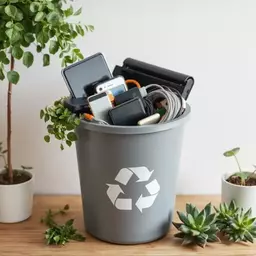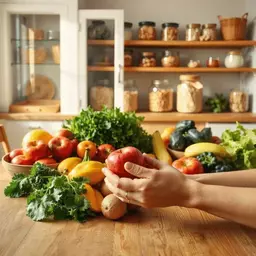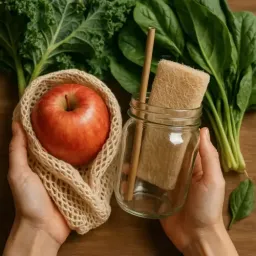What if the convenience of plastic came at a hidden cost to our planet? Every choice we make about plastic not only affects our environment but also impacts our health and well-being. Understanding this issue is crucial to fostering change and embracing a more sustainable lifestyle.
What You Will Learn
- The alarming effects of plastic pollution on wildlife and ecosystems.
- How long plastic takes to decompose and its contribution to climate change.
- The importance of connecting daily habits to plastic waste and making conscious choices.
- Effective strategies for raising awareness about plastic pollution in your community.
- The cost benefits of switching to eco-friendly alternatives and how they can save money long-term.
- The significance of supporting sustainable brands to encourage eco-friendly practices in the marketplace.
- Practical steps for creating a plastic-free routine and fostering community support.
- Ways to participate in community recycling programs and events to strengthen sustainability efforts.
Impact of Plastic Use and Sustainable Choices
Understanding the effects of plastic use and the benefits of sustainable alternatives is crucial. Below is a visual representation of key insights.
Plastic Pollution Impact
- Millions of tons of plastic waste end up in oceans and landfills every year.
- Plastic takes hundreds of years to decompose.
- It harms wildlife and contributes to climate change.
Benefits of Sustainable Choices
- Reusable bags save money in the long run.
- Stainless steel bottles eliminate the need for bottled water.
- Compostable products reduce landfill waste.
Long-Term Savings from Sustainability
- Ditching disposables saves on repeated purchases.
- Less waste leads to reduced disposal costs.
- Share knowledge about plastic pollution.
- Participate in local recycling programs.
- Organize or join sustainability events.
Understanding the Impact of Plastic Use in Daily Life
Plastic is everywhere in our daily lives, from the packaging of our food to the everyday items we use. It’s convenient, but have you ever paused to think about the real impact of plastic on our environment? At Eco Habits Daily, I believe understanding this impact is the first step toward making a change that benefits both us and our planet! For more insights on conscious living, check out our guide on mindful consumption for sustainable living.
Every year, millions of tons of plastic waste end up in our oceans and landfills, harming wildlife and polluting our earth. This pollution is not just an environmental issue; it affects our health and well-being too. By acknowledging the problem, we can take the necessary steps to reduce our plastic footprint, ensuring a healthier planet for future generations.
The Environmental Concerns of Plastic Pollution
The environmental concerns surrounding plastic pollution are alarming. Plastic takes hundreds of years to decompose, meaning that the items we throw away today will linger on our planet for a long time. Think about it: plastic waste harms wildlife, as animals often mistake it for food or become entangled in it, leading to injury or death.
Not only does plastic impact wildlife, but it also contributes to climate change. The production and incineration of plastic generate greenhouse gases, worsening the problem we’re all trying to fight. By becoming aware of these issues, we can motivate ourselves to seek alternatives in our daily lives!
- Plastic pollution harms marine life and ecosystems.
- It takes hundreds of years for plastic to decompose.
- Plastic production contributes to climate change.
Connecting Daily Habits to Plastic Waste
It’s essential to connect our daily habits to plastic waste. Many of us may not realize how our choices contribute to the problem. For instance, using single-use items like plastic bags, straws, and water bottles adds up quickly, creating a mountain of waste. By reflecting on our habits, we can identify areas for improvement!
At Eco Habits Daily, I like to think of our choices as ripples in a pond. Each small action we take can create an impact, inspiring others to follow suit. By choosing to use reusable options instead of disposables, we can collectively reduce plastic waste and foster a culture of sustainability. Discover more about making sustainable changes in your routine by reading about easy eco-friendly habits to start.
- Identify daily habits that contribute to plastic waste.
- Choose reusable items over single-use plastic.
- Inspire others to consider their consumption habits.
Plastic Pollution Awareness and Its Importance
Raising awareness about plastic pollution is crucial for fostering change. Without understanding the extent of the problem, it’s hard for people to care about making a difference. By sharing information, we empower others to take action and become more mindful of their consumption patterns.
Participating in community discussions and events can help spread the word about the importance of reducing plastic use. The more people know, the more they can participate in creating an eco-friendly future. Together, we can work towards a cleaner, greener planet, one small step at a time!
- Share information about plastic pollution with friends and family.
- Participate in community events focused on sustainability.
- Promote eco-friendly practices on social media.
Pro Tip
Did you know? By simply swapping out three single-use plastic items from your daily routine—like plastic straws, bags, and water bottles—for reusable alternatives, you can prevent up to 167 plastic items from entering landfills and oceans each year! Small changes can lead to significant impacts on our environment.
Evaluating the Economic Implications of Reducing Plastic Use
When we think about making changes to cut down on plastic use, it’s natural to wonder about the costs involved. However, switching to eco-friendly alternatives doesn’t have to break the bank. In fact, many people find that adopting sustainable habits can lead to surprising savings over time. By being mindful of our purchases, we can make choices that are not only good for the planet but also for our wallets!
One way to evaluate the financial aspects is to conduct a cost-benefit analysis of eco-friendly products. Let’s consider some options:
- Reusable bags: While they may have a higher upfront cost, they save money in the long run by eliminating the need for disposable bags.
- Stainless steel water bottles: Investing in a quality bottle means you won’t have to buy bottled water regularly.
- Compostable sponges: Although they might cost a bit more than traditional sponges, they break down naturally, reducing waste and ultimately saving landfill fees.
Long-Term Savings from Sustainable Choices
As we shift our habits, it’s essential to keep our eyes on the long-term savings. You might be surprised to learn that many sustainable choices lead to significant reductions in recurring expenses. For instance, by ditching single-use products, we can:
- Save money on constant replacements of disposable items.
- Eliminate the need for frequent trips to the store for plastic bags or bottled beverages.
- Reduce waste disposal costs, as less trash means fewer fees for waste services.
Ultimately, these changes not only promote a healthier planet but also contribute to a healthier budget. It’s all about making small adjustments that yield big results over time! For more details on managing waste, explore our article on eco-friendly junk removal.
Investing in Sustainable Brands and Products
Investing in sustainable brands is another vital aspect to consider. Supporting companies that prioritize eco-friendly practices can lead to a ripple effect in the market. When we choose products from brands committed to sustainability, we:
- Encourage more businesses to adopt environmentally-friendly practices.
- Help create a demand for innovative, sustainable products that can reduce plastic waste.
- Contribute to local economies by supporting sustainable initiatives.
At Eco Habits Daily, I always recommend checking the values and mission of brands before making purchases. It’s important to align our spending with our values, and every dollar spent on sustainable products is a step towards a greener future!
Encouraging Action: Next Steps to a Plastic-Free Routine
Ready to kickstart your journey towards a plastic-free routine? Embracing sustainable practices is easier than you think! To make it even more manageable, consider these practical steps:
- Set a specific goal, like reducing plastic use by 50% over three months.
- Keep a journal to track your progress and share your journey with friends.
- Join local environmental groups or online forums to connect with like-minded individuals.
Inviting Community Support and Shared Responsibility
Community support plays a vital role in maintaining sustainable habits. When we involve friends and family, we create a supportive environment that encourages each other to stay on track. Here are some ways to invite that support:
- Plan a monthly get-together to discuss sustainable practices and share tips.
- Set up challenges, like a “plastic-free week,” to motivate each other.
- Volunteer together for local clean-up events to foster a sense of community responsibility.
Remember, I believe that every action counts. When we come together, we can make a bigger impact!
Participating in Community Recycling Programs and Swap Events
Getting involved in community recycling programs and swap events is a wonderful way to promote sustainability. Not only do these initiatives help reduce plastic waste, but they also strengthen community ties. Here are a few ideas to consider:
- Check local listings for recycling events to ensure you're recycling correctly.
- Organize or participate in swap events where you can exchange items you no longer need.
- Become a volunteer to help promote awareness about recycling efforts in your community.
At Eco Habits Daily, I often share insights on how we can engage with our communities to create a more sustainable lifestyle. It’s all about taking those steps together, making them exciting and impactful! For more tips on responsible waste management, read our article on recycling tips for your home.
Frequently Asked Questions (FAQs)
- Q: How does plastic pollution impact wildlife and ecosystems?
- A: Millions of tons of plastic waste end up in oceans and landfills, harming wildlife that mistake it for food or become entangled. It also pollutes ecosystems and contributes to climate change.
- Q: How long does plastic take to decompose?
- A: Plastic takes hundreds of years to decompose, meaning that plastic items discarded today will persist on our planet for generations.
- Q: Can adopting sustainable habits save money?
- A: Yes, switching to eco-friendly alternatives like reusable bags and bottles can lead to long-term savings by eliminating the need for repeated purchases of disposable items and reducing waste disposal costs.
- Q: Why is supporting sustainable brands important?
- A: Supporting sustainable brands encourages more businesses to adopt environmentally friendly practices, helps create demand for innovative sustainable products, and contributes to local economies that prioritize sustainability.
- Q: What are some practical steps to start a plastic-free routine?
- A: Practical steps include setting specific reduction goals, tracking progress, joining environmental groups, using reusable items, and participating in community recycling or swap events.
Recap of Key Points
Here is a quick recap of the important points discussed in the article:
- Plastic pollution significantly harms wildlife and ecosystems, taking centuries to decompose.
- Our daily habits, such as using single-use plastics, contribute to the growing plastic waste problem.
- Raising awareness about plastic pollution is crucial for fostering change and encouraging sustainable practices.
- Switching to eco-friendly alternatives can lead to long-term savings and a healthier budget.
- Investing in sustainable brands encourages environmentally-friendly practices and supports local economies.
- Community involvement and support can enhance our efforts towards reducing plastic use.
- Participating in recycling programs and swap events strengthens community ties while promoting sustainability.










